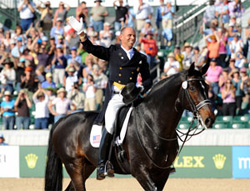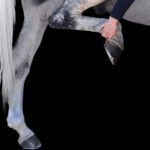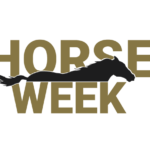[/caption]

October 3, 2010 — The U.S. eventing team, which had the silver medal within its grasp last night, loosened its grip this afternoon and fell to fourth, just missing the medals as Great Britain won, followed unexpectedly by Canada and New Zealand.
As was the case with the U.S. dressage team, which also finished fourth at the Alltech FEI World Equestrian Games last week, the happy news of the day was that America is now qualified for eventing in the 2012 London Olympics by virtue of its finish in the top five. That had been one of the goals in coming here.
Tension was in the air for the final phase, show jumping, in the big stadium. It was full of atmosphere and a fabulous course laid out by Richard Jeffery, who also designed the fences around a Kentucky theme that included Churchill Downs (you can see the twin spires in my photo of Michael Jung) and the Daniel Boone National Forest (you can see it in my photo of Andrew Nicholson).
Problems started for the U.S. when it lost one of the original team after Kim Severson’s mount, Tipperary Liadhnan, developed cellulitis just before the Games got under way. Karen O’Connor, slated to ride as an individual, filled in with Mandiba. She was the highest-placed American after Saturday’s cross-country, enjoying that status until fence seven of the 14-obstacle course, when Mandiba put on the brakes at the Kentucky Fence Line, a brown gate. He knocked it down as he stopped, and then knocked it down again when he finally cleared it, and the medal hunt was over. The U.S., which came into the show jumping with a mere 143.3 penalties, wound up with 160.3.
Meanwhile, Becky Holder, riding Courageous Comet as an individual, was looking at a medal yesterday after moving up to third following cross-country. However, the gray ex-racehorse had lost a front shoe on course and overcompensated with his other leg. He was held during the horse inspection and the decision finally was made to just withdraw and take him back to the stables to recuperate.
Buck Davidson, the lead-off rider for the U.S. as the lowest-placed of the country’s competitors (riders go in reverse order of penalties) had a rail down with Ballynoe Castle RM. It wasn’t a good weekend for the horse, who stopped on cross-country.
“The bottom line is he just needs to ride nicer. He’s a little strong and a little green still and he’s so careful. I just have to get him a little more confident and a little more rideable,” Buck said. “It’s still a great horse and he’ll have another day.”

The next U.S. rider to go, new American citizen Boyd Martin, a native of Australia, was saluted with deafening cheers by the crowd when he jumped a clear round on Neville Bardos. That boded well for the team, but Phillip Dutton had a rail and a time fault with Woodburn, and Karen’s mishap sealed the deal: No medal.
As the U.S. fortunes fell, Canada’s rose. Ninth after dressage, the Canadians moved up to third following cross-country and two clean rounds today from Selena O’Hanlon (Colombo) and Hawley Bennett-Awad (Gin & Juice) clinched the silver. Their 151.5 penalties was far behind Great Britain’s 139.4, with three of their riders going clean. One of them was William Fox-Pitt, the Rolex Kentucky 4-star event winner this year with Cool Mountain, who returned with the horse for another moment of glory in Kentucky as he got the individual silver.
New Zealand, which went from sixth to fourth to third during the course of the event, finished on 154.8 penalties by virtue of two clean show jumping rounds. One was from Andrew Nicholson on Nereo, the Aachen winner this year, who earned the bronze.

As he trotted into the ring, I kept thinking of the 1992 Olympics in Barcelona, where Andrew was leading for the individual gold and New Zealand was leading for the team gold. He had seven fences in hand aboard Spinning Rhombus (I don’t remember what I did this morning, but I’ll never forget that name!) and then proceeded to drop nine rails, along with many jaws in the stands. Andrew finished 16th and New Zealand wound up second to Australia. This time, however, Andrew made it through the finish line with all the fences intact.
I caught up with Jim Wolf, the U.S. Equestrian Federation’s executive director of sport programs, as he got ready to ride off on his bike after the jumping, with the sounds of the medal ceremonies in the background. It was a sad symphony for those who had wanted to be there, but weren’t.
Jim, who used to be the U.S. director of eventing activities, gave me his take on the team’s experience here.
Perhaps the most difficult day belonged to David O’Connor. An appropriate literary citation would be, “It was the best of times, it was the worst of times.” David is the president of the USEF, the husband of Karen O’Connor and the technical advisor of the Canadian eventing team. Talk about mixed emotions!
David took a Canadian team that hadn’t done much (its last world championships win was here in 1978) and made them into a powerhouse. Seems to me he would be a good candidate for the U.S. coaching job that will be open when Mark Phillips leaves after 2012.
Let David tell you all about what he was feeling on a very unusual afternoon.

It also was the best of times and the worst of times for the Germans, whose Michael Jung was first all the way through, but couldn’t keep the team with him. While they started out in first place after dressage, they went down to fifth after cross-country and stayed there.
Michael, however, was nothing short of brilliant on his horse with the powder puff name, La Biosthetique-Sam, sponsored by a cosmetics company. He finished on his dressage score of 33 penalties. So did William Fox-Pitt, but his dressage was a 42 and Andrew did the same, going from 14th to fifth to third with 43.5 penalties. So while “it’s not a dressage competition,” you better be good at that and show jumping as well as cross-country if you want to medal. Maybe a new cliche should be, “it’s not just a cross-country competition.”
Only 28 years old, Michael is a professional riding instructor from a family involved in the horse business. While it was his debut in the world championships, he was third last year in the European championships and first also at the German 4-star, Luhmuhlen, in 2009, so he’s not that much of a newcomer.
I asked him what it meant to him to win here.

After that, I talked to German eventing coach/chef d’equipe Hans Melzer to find out what happened to the German juggernaut. I found his insights very enlightening. The U.S. wasn’t the only team for which high hopes metastasized into big disappointment at the Kentucky Horse Park.
The eventers have left, but the WEG goes on (and on.) Show jumpers are finally in town and having a warm-up class tonight to get the feel of the ring. They start in earnest tomorrow, and I’ll be here to tell you all about it.
Until then,

Visit EquiSearch.com’s World Equestrian Games headquarters for news, blogs, photo galleries and more!





